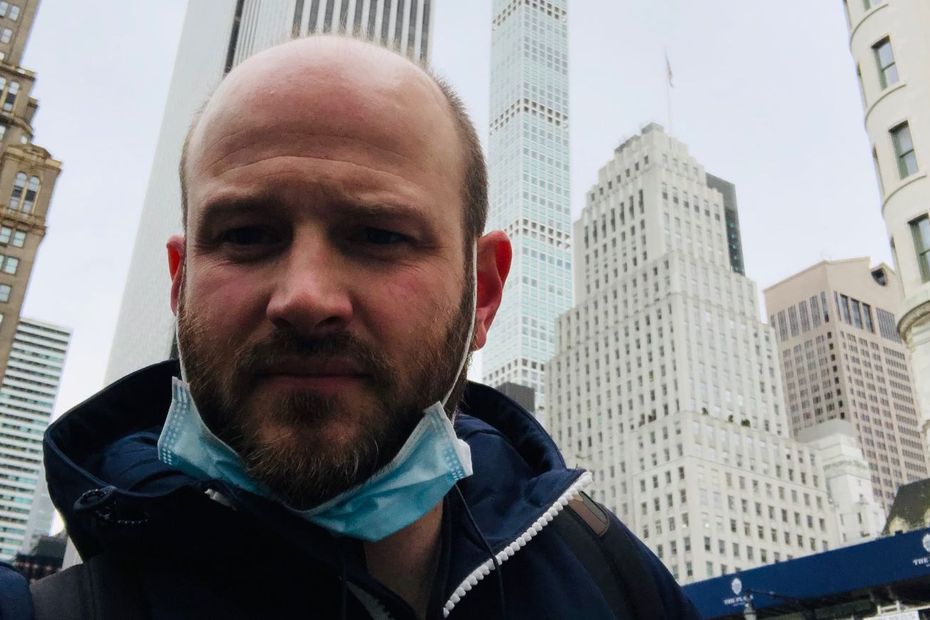While the United States is on the way to becoming the new epicenter of the Covid-19 pandemic, Comtois living in New York tell us about their daily life disrupted by confinement. They share their vision on how to manage the crisis on the other side of the Atlantic.
Large empty avenues, deserted shopping centers, parks without a living soul, the Big Apple looks like a ghost town. Yohann Cuynet, Jura native of Poligny, lives in the economic heart of New York, Manhattan. “What is most striking is the total absence of road traffic, the major arteries are completely empty”. In charge of the administration of the cultural service at the French embassy, for several weeks he has been teleworking and taking care of his children aged 7 and 5, also confined.
We did not expect a crisis of this magnitude
The world’s leading power is approaching the most bereaved countries. Having become the epicenter of the pandemic, in the United States in the last 24 hours, nearly 2,000 people infected with Covid-19 have died. A dramatic increase which brings the total number of registered deaths to 12,722. The megalopolis of the east coast is hit hard. New York State is the main focus of the epidemic in the United States. With nearly 5,500 dead and 140,000 cases, the economic capital of the country is now almost at a standstill. “We knew that New York would be severely affected, there are a lot of passages and exchanges in this city … However, the number of deaths in recent days is quite impressive. We did not expect a crisis of such a magnitude “, laments Yohann Cuynet.
An imposing military hospital ship to reinforce New York
Installed since 2016 in New York, the thirty-something is well aware that the hardest part is yet to come. “Friday April 3, we received an alert on our smartphones asking people who have training in the field of health to contact the town hall as soon as possible”, he explains. “The health system is suffering. By deploying a huge US Navy hospital ship to New York to relieve congestion in hospitals, the White House thought it was reassuring residents, but I think it rather scared people. “. Like many other states in the United States, New York is short of equipment, especially ventilators, its hospitals are overcrowded and the medical staff understaffed to handle the influx of patients.
Yohann Cuynet, an expatriate Jurassian in New York
–
Benjamin and Laura are reassured by noting the launch of a vast screening campaign. President Donald Trump boasted “to perform more tests than any other country in the world”, with some 1.8 million tests conducted to date. In a country with more than 320 million inhabitants, the proportion remains low. Benjamin and Laura, 30, live about 30 kilometers from New York, New Jersey. Both are from North Franche-Comté and have been living in the United States for 6 years. They too have been confined for nearly a month with their two-year-old daughter. “For the moment, confinement is not compulsory. It is strongly recommended but not compulsory. Schools and nurseries have been closed for three weeks. Particularly careful, for several weeks already, the Americans have decided to stay at home, to themselves”, explains the couple.
The most exposed are the most vulnerable
If confinement seems to work, this can be explained in particular by the weakness of health coverage in the United States. “Americans take no risk because hospitalizations and treatment are very expensive“. Benjamin works in the heart of Manhattan, customer service manager in a real estate agency, very early on, long before the first containment measures, his company recommended teleworking for all employees. As for Laura, she continues to go to the hospital, to the cancer research laboratory where she practices. Both consider themselves lucky, benefiting from a comfortable social situation which allows them in particular to benefit from health insurance.
Benjamin and Laura Perez, a Franche-Comté couple living in New Jersey
–
Many Americans have lost their jobs
The most exposed are the most vulnerable. “There is little job security here and social protections are weak, those who have no choice but to continue working are forced to go out every day at the risk of their lives.”, laments Yohann. Indeed, the social consequences of confinement are disastrous. “A lot of Americans have lost their jobs” adds Benjamin Perez. Within a week, 6.65 million Americans registered as unemployed. A staggering number which is partly explained by the recent widening of access criteria. Still, the United States, like many countries in the world, is going through an unprecedented economic crisis.
Everyone was taken aback by this health crisis and reacted too late
Across the Atlantic, the pandemic was not taken seriously soon enough by the federal government. This is the feeling shared by the three Franche-Comté expatriates. “Everyone was taken aback by this crisis, and everyone reacted too late, in Europe as in the USA”, says Laura Perez. Donald Trump for example gave up on March 28, to quarantine the states of New York and New Jersey, which are already badly affected. With three decision levels (federal, state, municipal), the instructions are sometimes confused or even contradictory in the country. A cacophony which explains the rather erratic management of the crisis by the country of Uncle Sam. The couple ended up concluding: “If containment had been put in place earlier on a global scale, we would not be there.”
–


